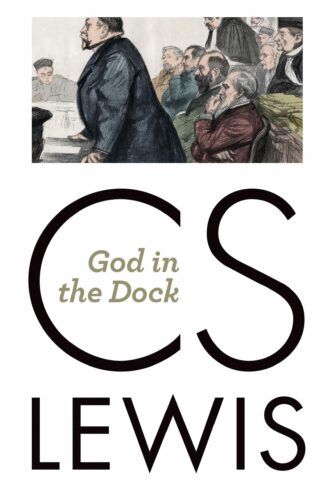 Is God Guilty?
Is God Guilty?
Author: C.S. Lewis
God in the Dock contains forty-eight essays and twelve letters penned by C.S. Lewis between 1940 and 1963. As such, it’s different from a lot of Lewis’ other writings. Many consider it more complete, with Lewis excelling in the short form, although I personally find him more powerful when he has room to flex his theological muscles and go in-depth on the different vantage points and arguments for and against a certain article of faith. Nevertheless, God in the Dock is unique in its frankness and willingness to essentially take God on and wrestle with our more, shall we say, sacrilegious questions: why God, why Christianity, why is such and such and this and that believed in this way, etc. It’s a good introduction to small snippets of Lewis on a variety of themes from miracles to reason, logic, and science vs faith and how they really meet up, merge, and ultimately support one another.
As with most collections, there are essays that shine with brilliance and transcendence, a clear-cut, and understandable apologetic on the behalf of the Christian worldview. Other essays are merely good, snippets that could serve as jumping off points to go more in-depth. And still others, less edifying. This usually is the letters, where we only here Lewis’ retort to a question or missive lost in time. Nevertheless, the entire collection is strong if not exactly cohesive.
In the preface, Walter Hooper of Jesus College, Oxford, mentions the difficulty of laying out the collection in a logical order; indeed, he admits to it being a mixed bag, loosely ordered. He ultimately decides to split the book into four parts. Part I details essays concerning theology and is, in the opinion of yours truly, the strongest portion of the collection. Part II focuses on semi-theological essays (some of which get into the politics of post-World War II London). Part III examines themes of basic ethics, and Part VI, the weakest edition in the lectionary, contains Lewis’ assorted letters, often responding to correspondence we do not see. This last part does, however, grant us a hilariously grumpy allegory on a commercialized Christmas town where the giving of “X-mas “cards is a truly heinous and seemingly never-ending battle of a cultural tradition of forced good-will.
I really see three central themes, all spread across Lewis’ writings here: an argument for why God and, also, how God. This gets to the central tenant of belief, and a lot of these essays are the first portion of the book. Here Lewis looks at how we look at God and where we fall short-sighted. With his usual clarity, he explicates a deceptively simple way of understanding the Great I Am – a glorified being so far beyond us that understanding in any enlightened terms is truly beyond our capacity. Lewis has a way of breaking down the hard to understand and organizing it out by its component parts with what can only be called modern-day parables. It’s this type of writing that he truly shines at and this type that showcases the firmness of his belief and the amazing complexity and brilliance of his own brain and ability to understand and break that understanding down into central terms. Such essays as “Evil and God,” “Dogma and the Universe,” “Answers to Questions on Christianity,” “Myth Become Fact,” “Horrid Red Things,” “The Laws of Nature,” and “Religion and Science” are the crux of this part of the collection.
These essays, among others, get to the basics of explaining God and his interaction with our world and also some of the greatest arguments seemingly against God, i.e. the undeniable existence of evil in the supposed perfection of God’s creation and the disparity between what we know and our collective human history and science with what many would call a fancy creation myth. Lewis addresses each head-on and succinctly, but with great detail and logic, explaining his position and how the existence of evil, our own human history and growing knowledge, and even the basis of science are not anti-God as many would have us believe. Lewis never dodges the hard questions, but instead seeks them out and presents all the arguments against Christianity with the same sort of dissection and attention to detail as a scientist’s interest in the truth, whatever that may be, as opposed to a person seeking to prove a pre-defined belief. This is where he shines strongest. This is also a good starting point for many who are new Christians, or simply interested in hearing why Christians believe what they do.
The second theme is a big one for Lewis: the belief in miracles and how they underpin the central supernatural and mystical component of Christianity and prove God’s ownership of this world and the logical structure he crafted for it. Here too Lewis isn’t afraid to bring science and even superstition to the forefront. He is unafraid to bring up the supposed contradictions of science and to address the arguments of many. Here again, Lewis shines and his articles on miracles are illuminating and particularly strong.
 The third general category is ethics based on current events – or the current events of post-World War II London to be specific. Here, God in the Dock moves from its loftier, bigger themes into more everyday applications. These essays in and of themselves are well-rendered and powerful, but admittedly not my favorites. It’s hard to explain because – although the essays are dated by mentions of the RAF and the particular cynicism and lack of knowledge represented by the everyman in the armed forces – they are still excruciatingly relevant to our day to day lives. Here Lewis gets into such troubled waters as the idea of punishment and how Christianity deals with such topics. He also talks about how priests and other purveyors of the Word need to come down from their own lofty Olympus and learn to speak and understand as their audience, in order to be clearer and more effective. There are also some more surprising topics – Christianity and the practice of vivisection in science, for example. As the book progresses and grand theology transforms into everyday advice, the essays get shorter. Perhaps this is what I liked less, because although the topics were still extremely relevant, there was less of a deep dive. This, though, is an aspect of reader preference and no failing on the part of Lewis.
The third general category is ethics based on current events – or the current events of post-World War II London to be specific. Here, God in the Dock moves from its loftier, bigger themes into more everyday applications. These essays in and of themselves are well-rendered and powerful, but admittedly not my favorites. It’s hard to explain because – although the essays are dated by mentions of the RAF and the particular cynicism and lack of knowledge represented by the everyman in the armed forces – they are still excruciatingly relevant to our day to day lives. Here Lewis gets into such troubled waters as the idea of punishment and how Christianity deals with such topics. He also talks about how priests and other purveyors of the Word need to come down from their own lofty Olympus and learn to speak and understand as their audience, in order to be clearer and more effective. There are also some more surprising topics – Christianity and the practice of vivisection in science, for example. As the book progresses and grand theology transforms into everyday advice, the essays get shorter. Perhaps this is what I liked less, because although the topics were still extremely relevant, there was less of a deep dive. This, though, is an aspect of reader preference and no failing on the part of Lewis.
Finally, God in the Dock ends, somewhat weakly, with a collection of letters. We don’t see the letters Lewis is responding to, and so the twelve letters are only somewhat illuminating – like overhearing only one half of a phone conversation. We do, however, get a brief sojourn into a grumpy Lewis who takes us to the island of Niatrib where Lewis takes us through the rites of “Exmas” among its beleaguered inhabitants. Here we have a hilarious gem about the giving and receiving of Christmas cards that remains a favorite comedic essay for me:
First of all, every citizen is obliged to send to each of his friends and relations a square piece of hard paper stamped with a picture, which in their speech is called an Exmas-card. . . . And because all men must send these cards the market-place is filled with the crowd of those buying them, so that there is great labour and weariness. But having bought as many as they suppose to be sufficient, they return to their houses and find there the like cards which others have sent to them. And when they find cards from any to whom they also have sent cards, they throw them away and give thanks to the gods that this labour at least is over for another year. But when they find cards from any to whom they have not sent, then they beat their breasts and wail and utter curses against the sender; and, having sufficiently lamented their misfortune, they put on their boots again and go out into the fog and rain and buy a card for him also.
In the end, God in the Dock is a must have for any serious student of theology and any Christian. Let it be noted that the title reinforces the overall theme, the dock not being as Americans call it a place for ships, but a British term for being on trial. We like to judge God, and often find him guilty due to our own lack of understanding or introspection. Here in these writings, however, Lewis flips the picture and shows us the true images that emerge from the muddle of our accusations and the complexity of human life and experience.
– Frances Carden
Follow my reviews on Twitter at: https://twitter.com/xombie_mistress
Follow my reviews on Facebook at: https://www.facebook.com/FrancesReviews
- Book Vs Movie: The Shining - April 6, 2020
- Thankful For Great Cozy Mysteries - December 13, 2019
- Cozy Mysteries for a Perfect Fall - October 20, 2019



